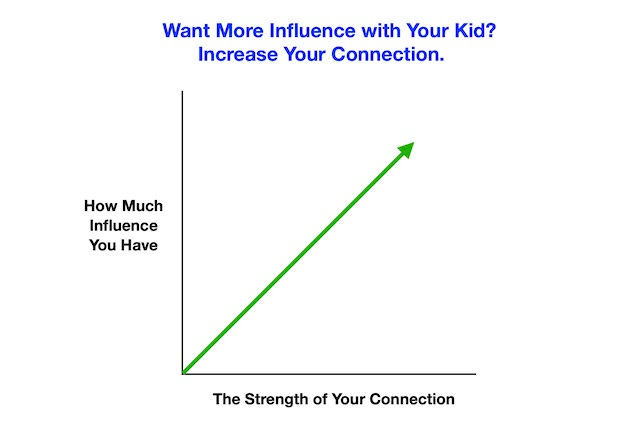Does your teen want nothing to do with you? Use the 5 F's to fix that today.
The Art and Science of Parenting #52
By: Catherine Lynch and Glenn Collins
Dear Awesome Parent,
Your once biddable child has turned into a pre-teen or teen you don’t even recognize. How did that even happen? (spoiler alert - hormones 🤣) and what can you do about it? Follow our easy-to-remember 5 F’s. They’ll set you back on the path to more joy, less drama, and lower blood pressure.
Got littles? They’ll be big soon enough. Read now and bookmark for later.
Are your kids grown? Read anyway, because: The 5 F’s also work well on your adult children. (Ask me how I know) Also because: Your grandkids will go through this phase and you’ll be better prepared to help your own children through it.
A mom recently lamented to us that her teenage daughter never wants to hang out with her anymore.
They used to be close but now her daughter doesn’t seem to want anything to do with her - unless it’s food, money, or a ride. The harder she tries to recapture their former closeness, the more it seems to drive her daughter away. This distance is just so painful for her. She knows the hurt is causing her to snap at her daughter, and that’s just making things worse. She’s at her wits end. She doesn’t know what to do.
This mom is running up against a natural drive all teens have: to separate from their parents, bond with peers, and establish an identity independent of their parents. They want to be, and be seen as, someone who’s capable, independent, and in charge of their own life.
You know this is normal and healthy. It’s what they’re wired to do, and you know (at some level) that you should be supportive of it. That it’s actually good for them - for their development into capable, independent adults. But it’s just so painful!
Your pre-teen or teen needs your input now more than ever, but you can’t force-feed it to them. They’re forging a new, more adult-like identity, trying on different world views, and juggling competing priorities. They’re experimenting with how they look and jostling for status with their peers. All while their hormones are in flux, their bodies are changing, and they’re navigating their emerging sexuality. Not to mention their assessment of risk vs. reward is tilted towards “Risky” - and their decisions are often very different from what yours would be.
So what’s a parent to do?
How do you get them to listen?
How do you maintain your influence?
Your connection with your kid is the key. It’s your best (and only) real avenue of influence. During the teen years, it’s more important than ever to work on maintaining and strengthening the bond to your kid.
Sure, you can try to control their behavior. And that can even be successful in the short term. You can stop them from doing things, going places, or associating with certain people (though that’s getting harder and harder with the technology these days). But you can’t force them to think the way you want, adopt your values, or have an identity and world view you approve of. They’re going to decide all of those things for themselves. How much attention they pay to you comes down to how much they trust, respect, and admire you. It’s a result of the quality of your connection.
The quality of your connection determines the extent of your influence.
Yes, really.
So how do you stay connected when their main focus seems to be breaking away?
The truth is, your teen still wants to be close to you. But they want it on their terms. Your teen has different priorities now and is driven to create their life on their own terms.
To stay connected, you have to work with their new priorities and meet them where they are -not where they were when they were a kid. To recognize them as the young adults they’re becoming - and treat them that way. To work with their priorities - instead of fighting them.
What are those priorities? What does your teen want?
Your teen wants to:
Manage their own lives: More than just about anything, your teen wants to be in charge of their life - even if they screw up sometimes. They don’t want to be told what to do - or what not to do. Ideally they want to make the decisions, but at the very least they want to be consulted.
Be respected. Your teen craves respect. From their peers and from you. They want to be in charge, or at least consulted, on all the things that affect them. They want freedom to make decisions about their life. They don’t want to to be treated like a kid anymore.
Feel competent: Like they’re on top of things. That they can make decisions and nothing bad happens.
Hang out with friends: Creating more mature relationships with their peers is a top priority, especially away from the supervision of parents or adults.
Have fun: Your teen is still young at heart and fun is a top priority - though it usually means taking risks with friends!
One great way to strengthen your connection is give them more agency. More say in the decisions that affect their lives. This doesn’t mean you give them total control (lol, definitely not). We advocate for the “guardrails approach”: your values will tell you where the red-line “no go” areas are, but inside those lines give your teen as much latitude as possible about running their lives. They will mess up, of course, but you’re still there to catch them. And that’s kind of the point.
Have conversations about your “no go’s” and why they’re important. Listen to what they have to say. If they feel they should be allowed to do something you don’t think is a good idea, let them to try to convince you. And really listen. One day, sooner than you think, they’ll be all grown up, making all their own decisions - and living with the consequences. Give them the gift of making decisions and experiencing the results while they’re still living at home with you.
Another important aspect of strengthening connection is spending time together. This can be hard with teens, because their focus is not their parents anymore - it’s their peers (and their devices!). There’s a lot of competition for their attention so hanging out with you has to be enjoyable.
So here’s the big secret to getting them to want to spend time with you:
Use the 5 F’s:
Food: Everyone needs to eat and food is great way to connect with people. And if your teens are anything like ours were, they’re always hungry! Use that. What’s their favorite food? Cook it together or go out to eat. Do they have a favorite place to eat out? Go there - it doesn’t have to be a special occasion. Is your kid a budding foodie? Explore new cuisines at home or at ethnic restaurants. There’s no shame in using your kid’s favorite food as a way to connect. (And don’t be a stickler about nutrition right now. Connection is your current priority.)
Fun: Do you like to have fun? Your teen certainly does. Having fun with someone is a surefire way to supercharge connection. Find ways to have fun with your kid - but make sure it’s their idea of fun, not just yours. Play their favorite video game together. Binge watch a series they love. Go shopping. Take a hike. Be silly. Lighten the mood.
Friends: Your kid’s friends are important to them and they want, and need, to hang out with them. When you include their friends in activities, they’ll be more interested in participating and engaged in the activity. Don’t include friends every time, but try it a few times. You may be surprised at how much more fun you have, too, when your kid’s friends tag along.
Fire: There’s just something about fire. It’s fascinating and draws people together. Kids are also just natural pyro’s! 😉. They love to play with it. Let them play with it. Outside. Under supervision. They’ll love you for it, and getting a minor burn is a small price to pay for increased connection.
Friendly: Friendly faces, friendly voices, friendly home. Your teen doesn’t want to spend time with people who judge them, shame them, or make them feel bad about themselves. As much as possible, use your cheerful, friendly voice. Put on your friendly ‘I’m a safe person to talk to’ face. Make your home a warm and friendly place where your kid wants to hang out. An inviting place where they feel relaxed and comfortable. Where there’s good food, access to wi-fi, and their friends are welcome.
Pro Tip: The more of the 5 F’s you can include in one activity, the more your kid will enjoy it. A family gathering around a bonfire with good music, their favorite foods, their friends, and outdoor games like corn hole is always a hit.
Prioritizing the relationship might sound like giving up discipline and letting them do whatever they want. It’s not.
The teen years are when it’s more important than ever to stick to your core values. To have boundaries. But if you want them to actually pay attention, you need a good relationship; because that allows you to have conversations where they actually listen. Where you have an influence on their hearts and minds. Because ultimately, it’s their hearts and minds that will determine their behavior when you’re not there with them.
Home Practice:
Talk to your parenting partner and decide on one area where you can give your kid more agency. Where do they most want more control over their life? Start there.
Review the 5 F’s and combine any two of them to create an activity your kid is likely to enjoy. Let us know how it goes!
A Red Bellied Woodpecker
This little guy landed on the tree right outside our window. He didn’t seem to mind that we were just a couple of feet away. We watched each other for a bit and then he went about his business.






